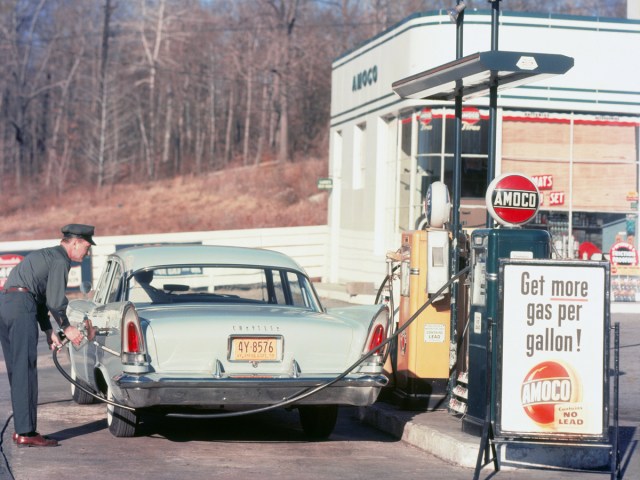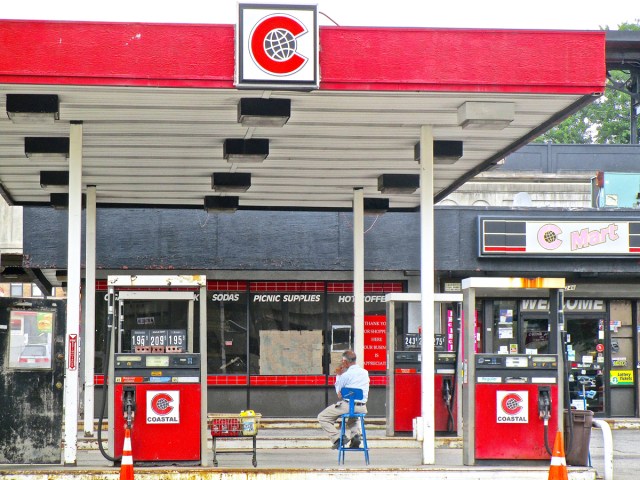Next time you find yourself in New Jersey, don’t try pumping your own gas — it’s not just a faux pas, but actually illegal. That has been the case since the Retail Gasoline Dispensing Safety Act was passed in 1949. “Because of the fire hazards directly associated with dispensing fuel,” the law reads, “it is in the public interest that gasoline operators have the control needed over that activity.” Though 49 other states allow self service, the Garden State has stuck with its decades-old ban. Here’s why you can’t pump your own gas in New Jersey.
Past Is Prologue

Long before “Jersey Girls Don’t Pump Gas” bumper stickers were sold, the only people who did pump gas were filling-station employees. These attendants were the norm throughout the country during the first half of the 20th century and into the 1960s. Even by 1968, 23 states still had bans on drivers fueling up their own cars. Between the early 1970s and 1992, however, the number of self-service stations exploded from 8% of all gas stations to 82%.
Not in the Garden State, however. The safety and logistical issues raised in the original 1949 bill, which range from the health hazards arising from exposure to toxic fumes to compliance with safety standards, remained on the books even as other states relaxed their own regulations.
Business interests played a role in enacting the ban and keeping it alive through the decades, according to the Bergen Record. In the late 1940s, Bergen County entrepreneur Irving Reingold opened the last self-service gasoline station in New Jersey on Route 17 in Paramus. Its cheaper prices were a hit with customers, but a cause for concern for rival station owners, who successfully lobbied the government to enact the ban on self-serve in the name of public safety.
Gas station owners feared “that if self-serve pumps were allowed in New Jersey, large oil companies would have the resources to invest in high-volume self-serve stations on the busiest highways and drive the small players out of business.”
Despite rumblings of overturning the ban in the decades since, it has stuck. Part of that has to do with how ingrained it has become in New Jersey culture. A 2022 Monmouth University poll found that 60% of Garden State residents still oppose allowing stations to do away with full service in favor of self service at gas stations.
“Being the last full-service-only state in the country seems to be a source of pride for many New Jerseyans,” said Patrick Murray, director of the Monmouth University Polling Institute. Governor Phil Murphy has also called the topic New Jersey’s “political third rail,” and one that he hasn’t been inclined to cross.
Last of Its Kind

Until recently, New Jersey wasn’t the only state where gas station attendants were ubiquitous. Thanks to a similar 1951 law, drivers in Oregon were likewise forbidden from pumping their own fuel. That law was finally overturned in 2023. Though studies showed that many Oregonians preferred having an employee fill their tanks for them, the new law had strong enough support for drivers to at least have the option of doing it themselves.
Oregon’s new regulations stipulate that self-service can’t account for more than half of the pumps at a service station. Additionally, stations won’t be allowed to charge more for full service, and at least one attendant has to be on hand to pump gas for drivers who’d prefer not to do it themselves.
Winds of Change

Though they’ve long been described as “a Jersey thing,” gas station attendants might not be long for the Garden State. In March 2025, state Senator Jon Bramnick reintroduced a bill that would give New Jerseyans the option to fill up their own tanks like people in every other state, with a few caveats. Gas stations with four or more pumps would be required to have both full-service and self-service options, and also to have an attendant on hand to assist anyone with a disability.
With more than half a century’s worth of history and debate behind it, the hot-button issue comes up every time gas prices increase. Some argue that going the self-service route will lower prices. Bramnick has conceded that his measure could be a “Dracula bill” that never sees the light of day, but that isn’t stopping him from trying, and only time will tell if New Jersey’s self-pumping ban remains on the books.
More from our network
Daily Passport is part of Inbox Studio, an email-first media company. *Indicates a third-party property.
















